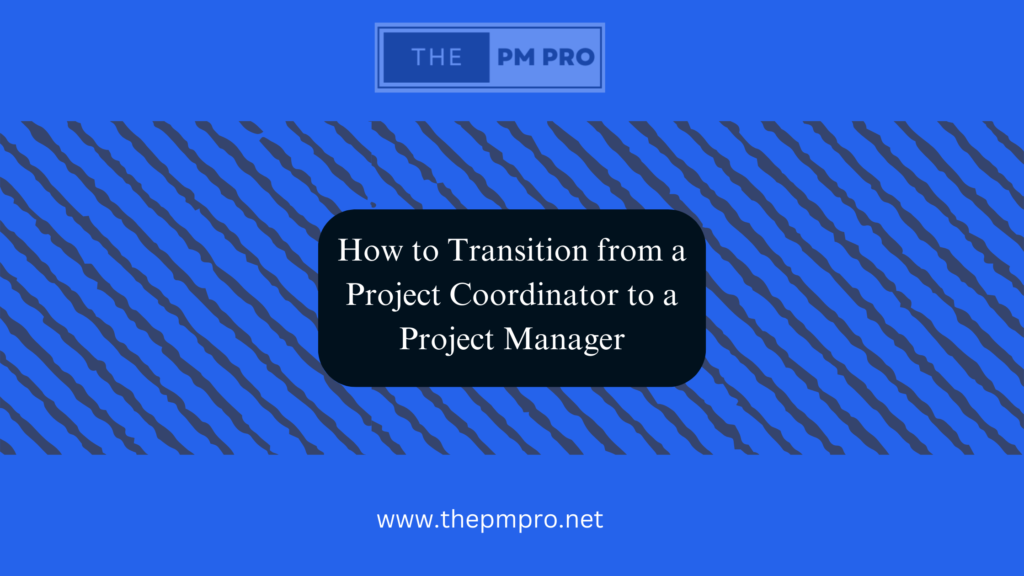What is a Project Coordinator
The project coordinator ensures that the project is organized and running all the time. The main responsibilities of a project coordinator are communication and administrative support to the project manager. The project coordinator carries out technical duties required to plan and complete a project. They ensure that the project runs smoothly and that every stakeholder is on schedule. They also work with clients to ensure every stakeholder is informed on goals and demands.

What is a Project Manager
A project manager is responsible for successful project completion. They ensure that the project team complies with the project schedule, scope, and budget throughout the project duration. They also organize the team, create timelines, keep in contact with every team member, and monitor project progress to ensure that project objectives are met. They are in charge of ensuring that the project meets the standards of superiors like accountants and CEOs and is successful. Project managers are responsible for making sure that the project is completed and that all essential requirements and goals of the client are addressed. And if the project gets off track, the project manager must get the project back on track.
How to Move From Project Coordinator to Project Manager
If you currently work as a project coordinator and want to move up the ladder and assume the role of a project manager at your organization, then you should follow a few steps to get to the position:
Assess your skills and experience
The first step to becoming a project manager is to assess your experience and skills as a project coordinator. Project coordinators are mostly involved in supporting the project managers with communication, scheduling, reporting, and documentation. They also have exposure to project management methodologies, tools, and best practices. However, project managers should have advanced skills in decision-making, leadership, negotiations, problem-solving, and strategic thinking. Identify your weaknesses and strengths as a project coordinator and determine the skills you need to improve and develop to become a project manager.
Pursue relevant education and certification
The next step is to pursue relevant certification and education that can enhance your credibility and knowledge. There are several options for project management education such as workshops, online education, books, podcasts, and blogs. You can also enroll in a diploma or a degree program in project management, engineering, business, or IT. Additionally, you can get a certification from a recognized project management education organization, such as the Project Management Institute which offers certifications such as the CAPM, PMP, and ACP.
Seek mentorship and feedback
The third step is to seek feedback and mentorship from project managers who can support you and guide you in your career development. You can meet mentors within our network, your organization, and your professional association. You can also join online forums and communities where you can learn from and interact with other project managers and get their advice and insights. Also ask for regular feedback from your peers, supervisors, and clients on your work as a project coordinator, and identify the areas where you can showcase your skills and improve.
Take on more challenges and responsibilities
The fourth step to becoming a project manager is to take on more challenges and responsibilities that can demonstrate your potential and readiness for the role. You can volunteer to manage or lead simpler or smaller projects, or parts of complex or larger projects. You can also contribute or initiate innovation, process improvement, or change management initiatives within your team or organization. You should also avail opportunities to expand your stakeholder relationships and network and to collaborate with other professionals and project managers across different domains and functions.
Update your portfolio and resume
The last step to becoming a project manager is to update your portfolio and resume to reflect your experience, skills, and achievements as a project coordinator and a potential project manager. You should highlight your certification and education in project management, as well as your contribution and involvement in different projects. You should also show your skills in managing project budgets, teams, stakeholders, and risks, and delivering outcomes. You should also include your samples of work such as reports, project plans, presentations, and testimonials that can show your project management results and capabilities.
How to Transition from a Project Coordinator to a Project Manager- FAQs
Do coordinators become managers?
Yes, project coordinators can become project managers and make a progress up the ladder in the organization.
Is a manager better than a coordinator?
Project managers are worth their weight and are essential in several industries. Whereas a project coordinator shares a lot of responsibilities with the project manager but on a larger scale. So, the project coordinator oversees parts of the projects, and the project manager looks at the larger parts.
What is a better project coordinator or project manager?
If you need a leader to manage your projects, hire a project manager. On the other hand, if you are looking to keep your team organized, you might better hire a project coordinator.
How do I move from coordinator to manager?
Work with your supervisor and make a plan to get you to the position you want, including action steps and timeline. It may include co-leading a project, developing your skills, or spending time training other roles and departments.
Do follow our Career Tips Section for more relevant articles


